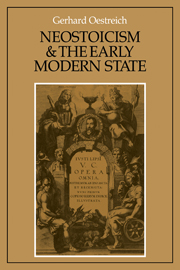Book contents
- Frontmatter
- Contents
- Foreword
- Introduction
- PART I JUSTUS LIPSIUS AND THE NETHERLANDS MOVEMENT
- PART II THE CONSTITUTIONAL DEVELOPMENT OF THE EARLY MODERN STATE
- 8 The religious covenant and the social contract
- 9 ‘Police’ and Prudentia civilis in the seventeenth century
- 10 From contractual monarchy to constitutionalism
- 11 The estates of Germany and the formation of the state
- 12 The constitutional situation of monarchy in Germany from the sixteenth to the eighteenth century
- 13 Army organization in the German territories from 1500 to 1800
- 14 The constitution of the Holy Roman Empire and the European state system 1648–1789
- 15 The structure of the absolute state
- Index
9 - ‘Police’ and Prudentia civilis in the seventeenth century
Published online by Cambridge University Press: 04 May 2010
- Frontmatter
- Contents
- Foreword
- Introduction
- PART I JUSTUS LIPSIUS AND THE NETHERLANDS MOVEMENT
- PART II THE CONSTITUTIONAL DEVELOPMENT OF THE EARLY MODERN STATE
- 8 The religious covenant and the social contract
- 9 ‘Police’ and Prudentia civilis in the seventeenth century
- 10 From contractual monarchy to constitutionalism
- 11 The estates of Germany and the formation of the state
- 12 The constitutional situation of monarchy in Germany from the sixteenth to the eighteenth century
- 13 Army organization in the German territories from 1500 to 1800
- 14 The constitution of the Holy Roman Empire and the European state system 1648–1789
- 15 The structure of the absolute state
- Index
Summary
On a visit to the princely library of Wolfenbüttel in 1707, Christian Thomasius discovered a partial print of the Political Testament of Dr Melchior von Osse, who had been chancellor to the Elector of Saxony in the mid sixteenth century. This was a manual on the government and administration of a German territorial state. Thomasius decided to have it printed in full, and accordingly it appeared in 1717 in a fine quarto volume of over 500 pages ‘for the use of Thomasius’ audience'. The work gives a detailed account of ‘police’ in the sense of ‘civil organization’ or ‘the regulation, discipline, and control of a community; civil administration; enforcement of law; public order’. Starting from a passage in Aristotle's Politics, which is quoted freely as ‘policiam esse ordinem quendam inhabitancium in principando et in subjiciendo’, Osse states that there are ‘four necessary things which pertain to the good police of a country or town: princeps, consilium, pretorium et populus’. One sees at once how comprehensively Osse uses the term ‘police’, and how little it has in common with the narrow modern sense of ‘the department of government which is concerned with the maintenance of public order and safety, and the enforcement of the law’ or ‘the civil force to which is entrusted the duty of maintaining public order, enforcing regulations for the prevention and punishment of breaches of the law, and detecting crime’.
- Type
- Chapter
- Information
- Neostoicism and the Early Modern State , pp. 155 - 165Publisher: Cambridge University PressPrint publication year: 1982
- 2
- Cited by



